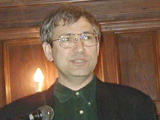|
|
TODAY.AZ / Society
Controversial Turkish writer Orhan Pamuk wins Nobel
12 October 2006 [15:41] - TODAY.AZ

The Swedish Academy said that Pamuk "in the quest for the melancholic soul of his native city has discovered new symbols for the clash and interlacing of cultures."
Born into a wealthy family in Istanbul on June 7, 1952, Pamuk has never been far from controversy inside Turkey where he has critics both from the religious conservative camp and the secular establishment.
Last December a controversial trial against Pamuk for 'insulting Turkishness' was dropped by the Turkish Justice Ministry following international criticism.
The writer had talked about the massacre of Armenians in Turkey during World War I, which Turkey denies, and had spoken of 'one million murdered Armenians.' If convicted he faced three years in prison.
The 220-year-old Swedish Academy, which has handed out literature's top prize since 1901, had five candidates on its short list, drawn from hundreds of nominations sent by invitation only.
Of the five finalists, only the winner will be revealed; the other four names are kept secret for 50 years.
Critics say Nobel literature laureates have been getting edgier and more controversial, and the academy's choice often bring its share of criticism.
In 2004, Austrian Elfriede Jelinek won for what the academy described as her talent for revealing "the absurdity of society's cliches and their subjugating power."
Her detractors said her work, known for its frank descriptions of sexuality, pathos and conflict between men and women, was distasteful and unworthy of such a prestigious award.
"I think the prize has become more interesting than it was 10, 15 years ago. It is more surprising, and they also dare to give it to authors who could be controversial," said Pelle Andersson, a literature critic for Sweden's biggest daily, Aftonbladet. The Associated Press
URL: http://www.today.az/news/society/31359.html
 Print version
Print version
Connect with us. Get latest news and updates.
See Also
- 11 April 2025 [15:44]
Azerbaijani woman recounts 1988 ordeal in Khankendi court hearing - 11 April 2025 [12:27]
Some 20 families relocate to rebuilt village of Hasanriz in Agdere - 11 April 2025 [11:23]
Human-like bone fragments unearthed in Qubadli: investigation launched - 10 April 2025 [13:17]
AFSA, WHO discuss progress on zoonotic disease control and early warning systems - 09 April 2025 [14:45]
Azerbaijan, UK discuss cooperation in humanitarian mine clearance - 09 April 2025 [14:02]
Great Return continues: 54 families relocated to rebuilt Sugovushan village - 08 April 2025 [15:58]
Hafiz Pa?ayev: Garabagh University forum paves way for stronger ties - 07 April 2025 [18:22]
Drug smuggling attempt foiled at Azerbaijani border - 07 April 2025 [11:45]
NAM Parliamentary Network's 4th Conference in Tashkent highlights Bandung Principles - 07 April 2025 [11:36]
Sahiba Gafarova re-elected Chair of NAM Parliamentary Network at Tashkent Conference
Most Popular
 National Art Museum director attends TURKSOY Museums' Union meeting
National Art Museum director attends TURKSOY Museums' Union meeting
 Azerbaijan, Qatar discuss prospects of cultural cooperation
Azerbaijan, Qatar discuss prospects of cultural cooperation
 They become completely arrogant: Neither the Armenians nor the EU are hiding their "cognac diplomacy" anymore
They become completely arrogant: Neither the Armenians nor the EU are hiding their "cognac diplomacy" anymore
 Azerbaijan's National Commission activities highlighted to UNESCO
Azerbaijan's National Commission activities highlighted to UNESCO
 Trial continues in Baku for 15 Armenian-origin individuals accused of war crimes
Trial continues in Baku for 15 Armenian-origin individuals accused of war crimes
 AzerGold explores new partnerships at Pakistan Mineral Investment Forum
AzerGold explores new partnerships at Pakistan Mineral Investment Forum
 US President Donald Trump criticizes Apple
US President Donald Trump criticizes Apple
